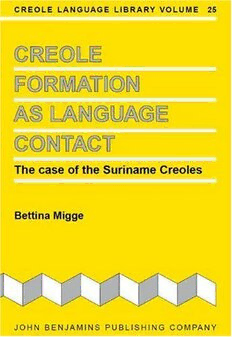
Creole Formation as Language Contact: The Case of the Suriname Creoles (Creole Language Library) PDF
164 Pages·2003·1.742 MB·
Most books are stored in the elastic cloud where traffic is expensive. For this reason, we have a limit on daily download.
Preview Creole Formation as Language Contact: The Case of the Suriname Creoles (Creole Language Library)
Description:
The research on the formation of (radical) creoles has seen an unprecedented intensification and diversification in the last 20 years. This book discusses, illustrates, and evaluates current research on creole formation based on an in-depth investigation of the processes and mechanisms that contributed to the emergence of the morphosyntactic system of the creoles of Suriname. The study draws on a rich corpus of a) natural conversational and elicited synchronic linguistic data from the Eastern Maroon Creole (EMC) and its main African substrate language, Gbe, b) published diachronic data from the EMC's sister-language Sranan Tongo, and c) information on the early history of Suriname coming from socio-historical investigations. It suggests that mechanisms of deliberate and contact-induced change also involved in borrowing and particularly shift situations led to the initial formation of the creoles of Suriname while language-internal change played a role in their subsequent development.
See more
The list of books you might like
Most books are stored in the elastic cloud where traffic is expensive. For this reason, we have a limit on daily download.
